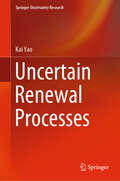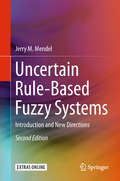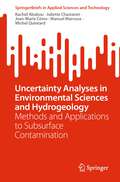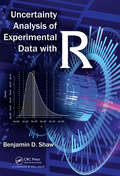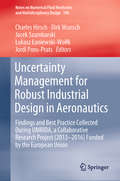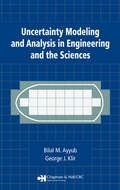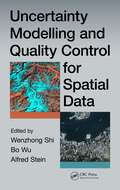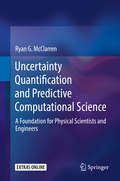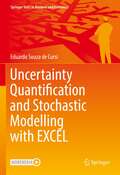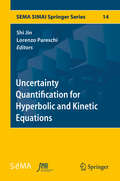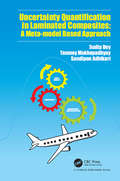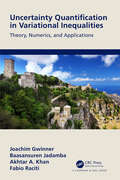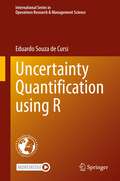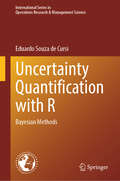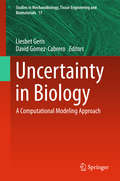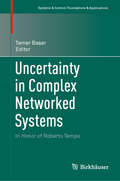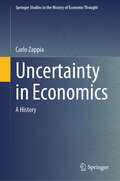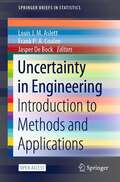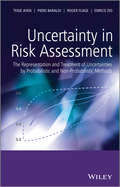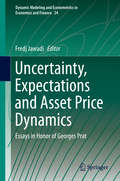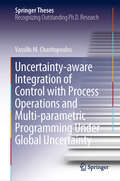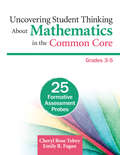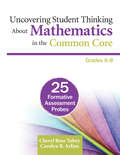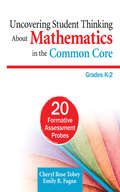- Table View
- List View
Uncertain Renewal Processes (Springer Uncertainty Research)
by Kai YaoThis book explores various renewal processes in the context of probability theory, uncertainty theory and chance theory. It also covers the applications of these renewal processes in maintenance models and insurance risk models. The methods used to derive the limit of the renewal rate, the reward rate, and the availability rate are of particular interest, as they can easily be extended to the derivation of other models. Its comprehensive and systematic treatment of renewal processes, renewal reward processes and the alternating renewal process is one of the book’s major features, making it particularly valuable for readers who are interested in learning about renewal theory. Given its scope, the book will benefit researchers, engineers, and graduate students in the fields of mathematics, information science, operations research, industrial engineering, etc.
Uncertain Rule-Based Fuzzy Systems: Introduction And New Directions
by Jerry M. Mendel*Type-2 fuzzy logic: Breakthrough techniques for modeling uncertainty *Key applications: digital mobile communications, computer networking, and video traffic classification *Detailed case studies: Forecasting time series and knowledge mining *Contains 90+ worked examples, 110+ figures, and brief introductory primers on fuzzy logic and fuzzy sets Breakthrough fuzzy logic techniques for handling real-world uncertainty. The world is full of uncertainty that classical fuzzy logic cant model. Now, however, theres an approach to fuzzy logic that can model uncertainty: type-2 fuzzy logic. In this book, the developer of type-2 fuzzy logic demonstrates how it overcomes the limitations of classical fuzzy logic, enabling a wide range of applications from digital mobile communications to knowledge mining. Dr. Jerry Mendel presents a bottom-up approach that begins by introducing traditional type-1 fuzzy logic, explains how it can be modified to handle uncertainty, and, finally, adds layers of complexity to handle increasingly sophisticated applications. Coverage includes: *The sources of uncertainty and the role of membership functions *Type-2 fuzzy sets: operations, properties, and centro
Uncertainty Analyses in Environmental Sciences and Hydrogeology: Methods and Applications to Subsurface Contamination (SpringerBriefs in Applied Sciences and Technology)
by Rachid Ababou Juliette Chastanet Jean-Marie Côme Manuel Marcoux Michel QuintardThis book highlights several methods and quantitative implementations of both probabilistic and fuzzy-based approaches to uncertainty quantification and uncertainty propagation through environmental subsurface pollution models with uncertain input parameters. The book focuses on methods as well as applications in hydrogeology, soil hydrology, groundwater contamination, and related areas (e.g., corrosion of nuclear waste canisters). The methods are illustrated for a broad spectrum of models, from non-differential I/O models to complex PDE solvers, including a novel 3D quasi-analytical model of contaminant transport, and a site-specific computer model of dissolved contaminant migration from a DNAPL (Dense Non Aqueous Phase Liquid) pollution source.
Uncertainty Analysis for Engineers and Scientists: A Practical Guide
by Faith A. MorrisonBuild the skills for determining appropriate error limits for quantities that matter with this essential toolkit. Understand how to handle a complete project and how uncertainty enters into various steps. Provides a systematic, worksheet-based process to determine error limits on measured quantities, and all likely sources of uncertainty are explored, measured or estimated. Features instructions on how to carry out error analysis using Excel and MATLAB®, making previously tedious calculations easy. Whether you are new to the sciences or an experienced engineer, this useful resource provides a practical approach to performing error analysis. Suitable as a text for a junior or senior level laboratory course in aerospace, chemical and mechanical engineering, and for professionals.
Uncertainty Analysis of Experimental Data with R
by Benjamin Shaw"This would be an excellent book for undergraduate, graduate and beyond….The style of writing is easy to read and the author does a good job of adding humor in places. The integration of basic programming in R with the data that is collected for any experiment provides a powerful platform for analysis of data…. having the understanding of data analysis that this book offers will really help researchers examine their data and consider its value from multiple perspectives – and this applies to people who have small AND large data sets alike! This book also helps people use a free and basic software system for processing and plotting simple to complex functions." Michelle Pantoya, Texas Tech University Measurements of quantities that vary in a continuous fashion, e.g., the pressure of a gas, cannot be measured exactly and there will always be some uncertainty with these measured values, so it is vital for researchers to be able to quantify this data. Uncertainty Analysis of Experimental Data with R covers methods for evaluation of uncertainties in experimental data, as well as predictions made using these data, with implementation in R. The books discusses both basic and more complex methods including linear regression, nonlinear regression, and kernel smoothing curve fits, as well as Taylor Series, Monte Carlo and Bayesian approaches. Features: 1. Extensive use of modern open source software (R). 2. Many code examples are provided. 3. The uncertainty analyses conform to accepted professional standards (ASME). 4. The book is self-contained and includes all necessary material including chapters on statistics and programming in R. Benjamin D. Shaw is a professor in the Mechanical and Aerospace Engineering Department at the University of California, Davis. His research interests are primarily in experimental and theoretical aspects of combustion. Along with other courses, he has taught undergraduate and graduate courses on engineering experimentation and uncertainty analysis. He has published widely in archival journals and became an ASME Fellow in 2003.
Uncertainty Management for Robust Industrial Design in Aeronautics: Findings and Best Practice Collected During UMRIDA, a Collaborative Research Project (2013–2016) Funded by the European Union (Notes on Numerical Fluid Mechanics and Multidisciplinary Design #140)
by Charles Hirsch Dirk Wunsch Jacek Szumbarski Łukasz Łaniewski-Wołłk Jordi Pons-PratsThis book covers cutting-edge findings related to uncertainty quantification and optimization under uncertainties (i.e. robust and reliable optimization), with a special emphasis on aeronautics and turbomachinery, although not limited to these fields. It describes new methods for uncertainty quantification, such as non-intrusive polynomial chaos, collocation methods, perturbation methods, as well as adjoint based and multi-level Monte Carlo methods. It includes methods for characterization of most influential uncertainties, as well as formulations for robust and reliable design optimization. A distinctive element of the book is the unique collection of test cases with prescribed uncertainties, which are representative of the current engineering practice of the industrial consortium partners involved in UMRIDA, a level 1 collaborative project within the European Commission's Seventh Framework Programme (FP7). All developed methods are benchmarked against these industrial challenges. Moreover, the book includes a section dedicated to Best Practice Guidelines for uncertainty quantification and robust design optimization, summarizing the findings obtained by the consortium members within the UMRIDA project. All in all, the book offers a authoritative guide to cutting-edge methodologies for uncertainty management in engineering design, covers a wide range of applications and discusses new ideas for future research and interdisciplinary collaborations.
Uncertainty Modeling and Analysis in Engineering and the Sciences
by George J. Klir Bilal M. AyyubEngineers and scientists often need to solve complex problems with incomplete information resources, necessitating a proper treatment of uncertainty and a reliance on expert opinions. Uncertainty Modeling and Analysis in Engineering and the Sciences prepares current and future analysts and practitioners to understand the fundamentals of knowledge a
Uncertainty Modelling and Quality Control for Spatial Data
by Wenzhong Shi Bo Wu Alfred SteinOffers New Insight on Uncertainty ModellingFocused on major research relative to spatial information, Uncertainty Modelling and Quality Control for Spatial Data introduces methods for managing uncertainties-such as data of questionable quality-in geographic information science (GIS) applications. By using original research, current advancement, and
Uncertainty Quantification and Predictive Computational Science: A Foundation for Physical Scientists and Engineers
by Ryan G. McClarrenThis textbook teaches the essential background and skills for understanding and quantifying uncertainties in a computational simulation, and for predicting the behavior of a system under those uncertainties. It addresses a critical knowledge gap in the widespread adoption of simulation in high-consequence decision-making throughout the engineering and physical sciences. Constructing sophisticated techniques for prediction from basic building blocks, the book first reviews the fundamentals that underpin later topics of the book including probability, sampling, and Bayesian statistics. Part II focuses on applying Local Sensitivity Analysis to apportion uncertainty in the model outputs to sources of uncertainty in its inputs. Part III demonstrates techniques for quantifying the impact of parametric uncertainties on a problem, specifically how input uncertainties affect outputs. The final section covers techniques for applying uncertainty quantification to make predictions under uncertainty, including treatment of epistemic uncertainties. It presents the theory and practice of predicting the behavior of a system based on the aggregation of data from simulation, theory, and experiment. The text focuses on simulations based on the solution of systems of partial differential equations and includes in-depth coverage of Monte Carlo methods, basic design of computer experiments, as well as regularized statistical techniques. Code references, in python, appear throughout the text and online as executable code, enabling readers to perform the analysis under discussion. Worked examples from realistic, model problems help readers understand the mechanics of applying the methods. Each chapter ends with several assignable problems. Uncertainty Quantification and Predictive Computational Science fills the growing need for a classroom text for senior undergraduate and early-career graduate students in the engineering and physical sciences and supports independent study by researchers and professionals who must include uncertainty quantification and predictive science in the simulations they develop and/or perform.
Uncertainty Quantification and Stochastic Modelling with EXCEL (Springer Texts in Business and Economics)
by Eduardo Souza de CursiThis book presents techniques for determining uncertainties in numerical solutions with applications in the fields of business administration, civil engineering, and economics, using Excel as a computational tool. Also included are solutions to uncertainty problems involving stochastic methods. The list of topics specially covered in this volume includes linear and nonlinear programming, Lagrange multipliers (for sensitivity), multi objective optimization, and Game Theory, as well as linear algebraic equations, and probability and statistics. The book also provides a selection of numerical methods developed for Excel, in order to enhance readers’ understanding. As such, it offers a valuable guide for all graduate and undergraduate students in the fields of economics, business administration, civil engineering, and others that rely on Excel as a research tool.
Uncertainty Quantification for Hyperbolic and Kinetic Equations (SEMA SIMAI Springer Series #14)
by Shi Jin Lorenzo PareschiThis book explores recent advances in uncertainty quantification for hyperbolic, kinetic, and related problems. The contributions address a range of different aspects, including: polynomial chaos expansions, perturbation methods, multi-level Monte Carlo methods, importance sampling, and moment methods. The interest in these topics is rapidly growing, as their applications have now expanded to many areas in engineering, physics, biology and the social sciences. Accordingly, the book provides the scientific community with a topical overview of the latest research efforts.
Uncertainty Quantification in Laminated Composites: A Meta-model Based Approach
by Sondipon Adhikari Sudip Dey Tanmoy MukhopadhyayOver the last few decades, uncertainty quantification in composite materials and structures has gained a lot of attention from the research community as a result of industrial requirements. This book presents computationally efficient uncertainty quantification schemes following meta-model-based approaches for stochasticity in material and geometric parameters of laminated composite structures. Several metamodels have been studied and comparative results have been presented for different static and dynamic responses. Results for sensitivity analyses are provided for a comprehensive coverage of the relative importance of different material and geometric parameters in the global structural responses.
Uncertainty Quantification in Variational Inequalities: Theory, Numerics, and Applications
by Akhtar A. Khan Joachim Gwinner Baasansuren Jadamba Fabio RacitiUncertainty Quantification (UQ) is an emerging and extremely active research discipline which aims to quantitatively treat any uncertainty in applied models. The primary objective of Uncertainty Quantification in Variational Inequalities: Theory, Numerics, and Applications is to present a comprehensive treatment of UQ in variational inequalities and some of its generalizations emerging from various network, economic, and engineering models. Some of the developed techniques also apply to machine learning, neural networks, and related fields. Features First book on UQ in variational inequalities emerging from various network, economic, and engineering models Completely self-contained and lucid in style Aimed for a diverse audience including applied mathematicians, engineers, economists, and professionals from academia Includes the most recent developments on the subject which so far have only been available in the research literature
Uncertainty Quantification using R (International Series in Operations Research & Management Science #335)
by Eduardo Souza de CursiThis book is a rigorous but practical presentation of the techniques of uncertainty quantification, with applications in R and Python. This volume includes mathematical arguments at the level necessary to make the presentation rigorous and the assumptions clearly established, while maintaining a focus on practical applications of uncertainty quantification methods. Practical aspects of applied probability are also discussed, making the content accessible to students. The introduction of R and Python allows the reader to solve more complex problems involving a more significant number of variables. Users will be able to use examples laid out in the text to solve medium-sized problems. The list of topics covered in this volume includes linear and nonlinear programming, Lagrange multipliers (for sensitivity), multi-objective optimization, game theory, as well as linear algebraic equations, and probability and statistics. Blending theoretical rigor and practical applications, this volume will be of interest to professionals, researchers, graduate and undergraduate students interested in the use of uncertainty quantification techniques within the framework of operations research and mathematical programming, for applications in management and planning.
Uncertainty Quantification with R: Bayesian Methods (International Series in Operations Research & Management Science #352)
by Eduardo Souza de CursiThis book is a rigorous but practical presentation of the Bayesian techniques of uncertainty quantification, with applications in R. This volume includes mathematical arguments at the level necessary to make the presentation rigorous and the assumptions clearly established, while maintaining a focus on practical applications of Bayesian uncertainty quantification methods. Practical aspects of applied probability are also discussed, making the content accessible to students. The introduction of R allows the reader to solve more complex problems involving a more significant number of variables. Users will be able to use examples laid out in the text to solve medium-sized problems.The list of topics covered in this volume includes basic Bayesian probabilities, entropy, Bayesian estimation and decision, sequential Bayesian estimation, and numerical methods. Blending theoretical rigor and practical applications, this volume will be of interest to professionals, researchers, graduate and undergraduate students interested in the use of Bayesian uncertainty quantification techniques within the framework of operations research and mathematical programming, for applications in management and planning.
Uncertainty in Biology
by Liesbet Geris David Gomez-CabreroComputational modeling allows to reduce, refine and replace animal experimentation as well as to translate findings obtained in these experiments to the human background. However these biomedical problems are inherently complex with a myriad of influencing factors, which strongly complicates the model building and validation process. This book wants to address four main issues related to the building and validation of computational models of biomedical processes: 1. Modeling establishment under uncertainty 2. Model selection and parameter fitting 3. Sensitivity analysis and model adaptation 4. Model predictions under uncertainty In each of the abovementioned areas, the book discusses a number of key-techniques by means of a general theoretical description followed by one or more practical examples. This book is intended for graduate students and researchers active in the field of computational modeling of biomedical processes who seek to acquaint themselves with the different ways in which to study the parameter space of their model as well as its overall behavior.
Uncertainty in Complex Networked Systems: In Honor of Roberto Tempo (Systems & Control: Foundations & Applications)
by Tamer BaşarThe chapters in this volume, and the volume itself, celebrate the life and research of Roberto Tempo, a leader in the study of complex networked systems, their analysis and control under uncertainty, and robust designs. Contributors include authorities on uncertainty in systems, robustness, networked and network systems, social networks, distributed and randomized algorithms, and multi-agent systems—all fields that Roberto Tempo made vital contributions to. Additionally, at least one author of each chapter was a research collaborator of Roberto Tempo’s.This volume is structured in three parts. The first covers robustness and includes topics like time-invariant uncertainties, robust static output feedback design, and the uncertainty quartet. The second part is focused on randomization and probabilistic methods, which covers topics such as compressive sensing, and stochastic optimization. Finally, the third part deals with distributed systems and algorithms, and explores matters involving mathematical sociology, fault diagnoses, and PageRank computation.Each chapter presents exposition, provides new results, and identifies fruitful future directions in research. This book will serve as a valuable reference volume to researchers interested in uncertainty, complexity, robustness, optimization, algorithms, and networked systems.
Uncertainty in Economics: A History (Springer Studies in the History of Economic Thought)
by Carlo ZappiaThis book introduces the economic theories that have placed uncertainty at the core of economic discourse. Covering the works of John Maynard Keynes and Frank Knight, as well as those of John von Neumann, Oskar Morgenstern, and Leonard Savage, it reconstructs the complex history of how economists have analyzed uncertainty, as distinct from risk, in the twentieth century. The text delves into the question of the extent to which uncertainty is a measurable entity, focusing on the perspective of those authors who have attempted to demonstrate its irreducibility to risk, with particular regard to Daniel Ellsberg and the ensuing current decision theory. The book will appeal to scholars of the history of economic thought, as well as students of advanced microeconomics, decision theory, game theory, and history of economic thought.
Uncertainty in Engineering: Introduction to Methods and Applications (SpringerBriefs in Statistics)
by Frank P. A. Coolen Louis J. M. Aslett Jasper De BockThis open access book provides an introduction to uncertainty quantification in engineering. Starting with preliminaries on Bayesian statistics and Monte Carlo methods, followed by material on imprecise probabilities, it then focuses on reliability theory and simulation methods for complex systems. The final two chapters discuss various aspects of aerospace engineering, considering stochastic model updating from an imprecise Bayesian perspective, and uncertainty quantification for aerospace flight modelling. Written by experts in the subject, and based on lectures given at the Second Training School of the European Research and Training Network UTOPIAE (Uncertainty Treatment and Optimization in Aerospace Engineering), which took place at Durham University (United Kingdom) from 2 to 6 July 2018, the book offers an essential resource for students as well as scientists and practitioners.
Uncertainty in Risk Assessment
by Enrico Zio Terje Aven Roger Flage Piero BaraldiExplores methods for the representation and treatment of uncertainty in risk assessmentIn providing guidance for practical decision-making situations concerning high-consequence technologies (e.g., nuclear, oil and gas, transport, etc.), the theories and methods studied in Uncertainty in Risk Assessment have wide-ranging applications from engineering and medicine to environmental impacts and natural disasters, security, and financial risk management. The main focus, however, is on engineering applications.While requiring some fundamental background in risk assessment, as well as a basic knowledge of probability theory and statistics, Uncertainty in Risk Assessment can be read profitably by a broad audience of professionals in the field, including researchers and graduate students on courses within risk analysis, statistics, engineering, and the physical sciences.Uncertainty in Risk Assessment:Illustrates the need for seeing beyond probability to represent uncertainties in risk assessment contexts.Provides simple explanations (supported by straightforward numerical examples) of the meaning of different types of probabilities, including interval probabilities, and the fundamentals of possibility theory and evidence theory.Offers guidance on when to use probability and when to use an alternative representation of uncertainty.Presents and discusses methods for the representation and characterization of uncertainty in risk assessment.Uses examples to clearly illustrate ideas and concepts.
Uncertainty, Expectations and Asset Price Dynamics: Essays in Honor of Georges Prat (Dynamic Modeling and Econometrics in Economics and Finance #24)
by Fredj JawadiWritten in honor of Emeritus Professor Georges Prat (University of Paris Nanterre, France), this book includes contributions from eminent authors on a range of topics that are of interest to researchers and graduates, as well as investors and portfolio managers. The topics discussed include the effects of information and transaction costs on informational and allocative market efficiency, bubbles and stock price dynamics, paradox of rational expectations and the principle of limited information, uncertainty and expectation hypotheses, oil price dynamics, and nonlinearity in asset price dynamics.
Uncertainty-aware Integration of Control with Process Operations and Multi-parametric Programming Under Global Uncertainty (Springer Theses)
by Vassilis M. CharitopoulosThis book introduces models and methodologies that can be employed towards making the Industry 4.0 vision a reality within the process industries, and at the same time investigates the impact of uncertainties in such highly integrated settings. Advances in computing power along with the widespread availability of data have led process industries to consider a new paradigm for automated and more efficient operations. The book presents a theoretically proven optimal solution to multi-parametric linear and mixed-integer linear programs and efficient solutions to problems such as process scheduling and design under global uncertainty. It also proposes a systematic framework for the uncertainty-aware integration of planning, scheduling and control, based on the judicious coupling of reactive and proactive methods. Using these developments, the book demonstrates how the integration of different decision-making layers and their simultaneous optimisation can enhance industrial process operations and their economic resilience in the face of uncertainty.
Uncovering Student Thinking About Mathematics in the Common Core, Grades 3-5: 25 Formative Assessment Probes
by Cheryl Rose Tobey Emily R. FaganTake the guesswork out of grades 3-5 math assessment! Quickly pinpoint and reverse your students’ common math difficulties with this detailed and easy-to-follow resource from best-selling authors Cheryl Tobey and Carolyn Arline. Twenty research-based assessment probes help you ask the right questions to uncover just where your students get confused – while learning is already underway. These CCSM-aligned probes eliminate all guesswork and will help you: Systematically address conceptual and procedural mistakes Plan targeted instruction and remediation in multiplication and division, problem solving, the four operations, factorization, and beyond Master essential CCSM mathematical processes and proficiencies for Grades 3-5
Uncovering Student Thinking About Mathematics in the Common Core, Grades 6-8: 25 Formative Assessment Probes
by Cheryl Rose Tobey Carolyn B. ArlinePinpoint and reverse math misconceptions with laser-like accuracy Here’s the middle-grades math resource you’ve been waiting for! Bestselling authors Cheryl Tobey and Carolyn Arline are back with 25 entirely new assessment probes that pinpoint subconcepts within the new Common Core Standards for Mathematics to promote deep learning and expert math instruction. Learn to ask the right questions to uncover common student misconceptions. Get practical instructional ideas that build new and accurate skills--while learning is already underway. It’s all here in this detailed and grade-level specific guide. Organized by strand, the probes will enable you to: Quickly and objectively evaluate common misconceptions around fractions and decimals, linear equations, ratios and percents, statistics, and more Systematically address conceptual misunderstandings and procedural mistakes--before they become long-term problems Help students better understand areas of difficulty Plan targeted instruction that builds on students’ current understandings while addressing areas of struggle Master the essential CCSM mathematical processes and proficiencies for Grades 6-8 You’ll find sample student responses, extensive Teacher Notes, and research-based tips and resources. Eliminate the guesswork and join thousands of busy middle-grades teachers who’ve used these easy-to-implement tools to foster solid math proficiency! "This book will definitely help mathematics teachers now that the CCSS are becoming such a big part of our teaching." —Debra A. Scarpelli, Middle School Mathematics Teacher RIMLE President, PARCC/CCSS ELC Cadre for Rhode Island, and Adjunct Professor
Uncovering Student Thinking About Mathematics in the Common Core, Grades K–2: 20 Formative Assessment Probes
by Cheryl Rose Tobey Emily R. FaganGet to the core of your students’ understanding of math! Quickly and reliably identify your primary students’ math knowledge with these convenient and easy-to-implement diagnostic tools! Tobey and Fagan provide 25 new assessments specifically for Grades K–2 and directly aligned with the Common Core. Organized by strand, the probes will enable you to: Quickly and objectively evaluate each child’s prior knowledge of basic math and numeracy Systematically address common mistakes and obstacles before they become long-term problems Make sound instructional choices to improve all students’ math skills
